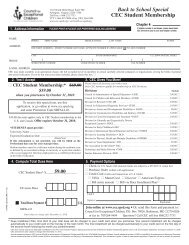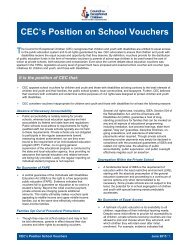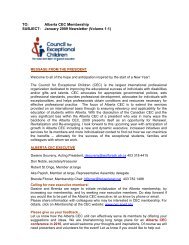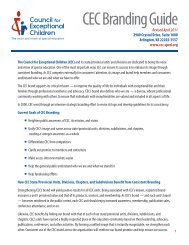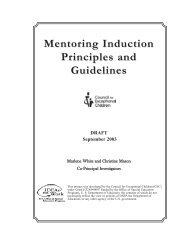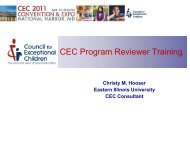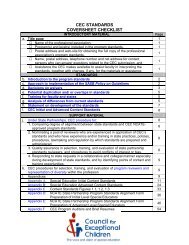What Every Must Know Special Educator - Council for Exceptional ...
What Every Must Know Special Educator - Council for Exceptional ...
What Every Must Know Special Educator - Council for Exceptional ...
Create successful ePaper yourself
Turn your PDF publications into a flip-book with our unique Google optimized e-Paper software.
(3) Con<strong>for</strong>m to policies, statutes, and rules<br />
established by state/ provincial and local<br />
agencies relating to judicious application<br />
of disciplinary methods and behavioral<br />
procedures.<br />
(4) Take adequate measures to discourage,<br />
prevent, and intervene when a colleague’s<br />
behavior is perceived as being detrimental to<br />
exceptional students.<br />
(5) Refrain from aversive techniques unless<br />
repeated trials of other methods have failed<br />
and only after consultation with parents and<br />
appropriate agency officials.<br />
c. Support Procedures<br />
(1) Adequate instruction and supervision shall<br />
be provided to professionals be<strong>for</strong>e they are<br />
required to per<strong>for</strong>m support services <strong>for</strong> which<br />
they have not been prepared previously.<br />
(2) Professionals may administer medication,<br />
where state/provincial policies do not<br />
preclude such action, if qualified to do so or<br />
if written instructions are on file which state<br />
the purpose of the medication, the conditions<br />
under which it may be administered, possible<br />
side effects, the physician’s name and phone<br />
number, and the professional liability if a<br />
mistake is made. The professional will not be<br />
required to administer medication.<br />
(3) Professionals note and report to those<br />
concerned whenever changes in behavior<br />
occur in conjunction with the administration<br />
of medication or at any other time.<br />
d. Parent Relationships<br />
Professionals seek to develop relationships with<br />
parents based on mutual respect <strong>for</strong> their roles<br />
in achieving benefits <strong>for</strong> the exceptional person.<br />
<strong>Special</strong> education professionals:<br />
(1) Develop effective communication with<br />
parents, avoiding technical terminology, using<br />
the primary language of the home, and other<br />
modes of communication when appropriate.<br />
(2) Seek and use parents’ knowledge and expertise<br />
in planning, conducting, and evaluating<br />
special education and related services <strong>for</strong><br />
persons with exceptionalities.<br />
278 whAt every SpeCiAl eduCAtor muSt <strong>Know</strong><br />
(3) Maintain communications between parents<br />
and professionals with appropriate respect <strong>for</strong><br />
privacy and confidentiality.<br />
(4) Extend opportunities <strong>for</strong> parent education<br />
utilizing accurate in<strong>for</strong>mation and professional<br />
methods.<br />
(5) In<strong>for</strong>m parents of the educational rights of<br />
their children and of any proposed or actual<br />
practices which violate those rights.<br />
(6) Recognize and respect cultural diversities<br />
which exist in some families with persons<br />
with exceptionalities.<br />
(7) Recognize that relationship of home and<br />
community environmental conditions affects<br />
the behavior and outlook of the exceptional<br />
person.<br />
e. Advocacy<br />
<strong>Special</strong> education professionals serve as advocates<br />
<strong>for</strong> exceptional students by speaking, writing, and<br />
acting in a variety of situations on their behalf.<br />
They:<br />
(1) Continually seek to improve government<br />
provisions <strong>for</strong> the education of persons with<br />
exceptionalities while ensuring that public<br />
statements by professionals as individuals<br />
are not construed to represent official policy<br />
statements of the agency that employs them.<br />
(2) Work cooperatively with and encourage<br />
other professionals to improve the provision<br />
of special education and related services to<br />
persons with exceptionalities.<br />
(3) Document and objectively report to one’s<br />
supervisors or administrators inadequacies in<br />
resources and promote appropriate corrective<br />
action.<br />
(4) Monitor <strong>for</strong> inappropriate placements in<br />
special education and intervene at appropriate<br />
levels to correct the condition when such<br />
inappropriate placements exist.<br />
(5) Follow local, state/provincial and federal<br />
laws and regulations which mandate a free<br />
appropriate public education to exceptional<br />
students and the protection of the rights<br />
of persons with exceptionalities to equal<br />
opportunities in our society.



